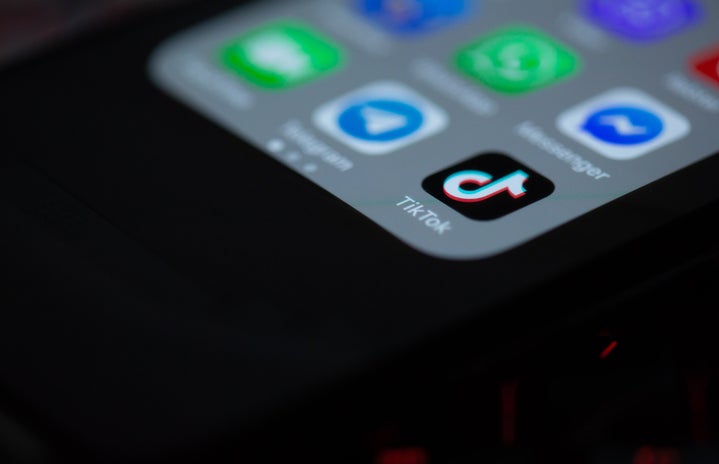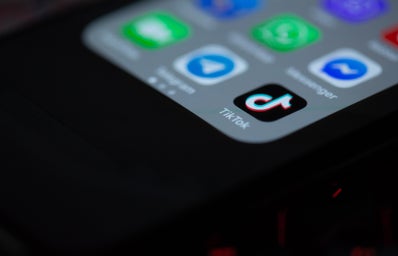With its debut in 2016, Tik Tok has soared to unimaginable popularity. Forbes attributes the app’s success to its easy use, encouragement of quality content, and a feeling of interconnectedness. Especially in a pandemic, sending Tik Toks to your friends allows us to stay in touch — or at least, that’s how it’s portrayed on the surface.
Somewhere down the line, the beloved app that lets us keep close to friends, becomes an addiction. It’s slow at first — 15 minutes stolen here and there that build to become hours of mindless scrolling. Next thing you know, you’re sitting in your zoom class, fidgeting as you reach out to grab your phone (thank muscle memory for that one).
Holding myself in high regard, I was under the false pretense that I had my Tik Tok usage under control. Reality soon hit when I checked my screen time and saw a whopping 5 hours staring back at me.

The harsh reality began to sink in: I needed to delete the app. Now, don’t get me wrong here: the pandemic has taken a toll on the mental health of the average person. What I’ve come to realize, however, is how much social media plays into that. About a month ago, I finally followed through with the dreaded action of deleting the app.
Strange can’t even begin to encompass the whirlwind of emotions I experienced. It isn’t until you can’t distract yourself even for a few seconds that you realize just how frequently we try to avoid healthy habits. For simplicity’s sake, these ‘healthy habits’ I’m referring to revolve around mental health, physical well-being, and relationships.
Now that I wasn’t wasting an embarrassing 5 hours daily on Tik Tok, the excuses for procrastination faded. There was ample time in my day and I had to fill it with something. At first, I attempted to fill the silence with Netflix and YouTube. It wasn’t long after that I realized there’s a cap to the amount of television that one can watch.
So instead, I turned to old habits. Here’s how deleting Tik Tok affected other areas of my life.
Mental Health
Tik Tok offers a unique experience in the sense that your ‘for you’ page is essentially decided for you. Sure, there are tricks to tailor this page to your liking, but for the most part, we don’t always choose what we’re seeing. On other social media platforms, I had the ability to control every aspect of my feed; so, when I saw posts that affected my view of myself, I could easily remove it. What began as a one-off experience turned into a consistent down-on-myself perspective as my Tik Tok usage increased.

Other activities include, but are not limited to becoming stronger in your faith, painting, and journaling. When you’re not mindlessly scrolling, it forces you to be more present, filling time with activities designed to benefit you.
Physical Well-Being
Quarantine 15 hit hard. I was always naive, believing that I couldn’t gain weight no matter what I ate, but this pandemic has shown me that’s not the case. Relating back to Tik Tok, it was tough to grapple with the reality that not everyone was facing the same issues I was. Feeling incredibly discouraged, I falsely believed that my goal to get my old shape back was unattainable.

Deleting Tik Tok forced me to act, rather than feel hopeless. There were no videos to compare myself to. For a month, I exercised consistently. Although I haven’t seen any physical changes, I’ve noticed an improvement in my mental health.
Running makes me happy.
Being able to go further in my abs exercises before taking a break brings me immense joy.
Listening to Crime Junkie as I sweat buckets? Bring it on.
As someone who was once incredibly fit, getting back into consistent exercise is tough. It’s even tougher when exercises that were once a breeze now bring a great deal of pain. The Tik Toks certainly did not help that internal battle.
If you’ve been struggling with the same concerns, evaluate the areas that are holding you back. You might be surprised to find that you’re no longer inspired by the same things.
Oh, and let’s not forget about the improved quality of sleep!
Relationships
Of all noticeable changes, this one definitely took me by surprise.
Think about it: how much of your conversations are based on sending your friends Tik Toks? Even if you believe it’s not significant, I’m willing to bet that it is.


Social media has undoubtedly changed the world for the better. It provides us with multiple platforms to share our opinion, speak up on important issues, and connect with those dear to us. I never want to disregard the connection it’s offered us, especially with the circumstances created by the pandemic.
As is the case with anything, you can have too much of a good thing. In my situation, that ‘thing’ was Tik Tok.
Remember the ABCs: always be responsible with your scrolling habits, be mindful of your intake, and consume content in moderation.


